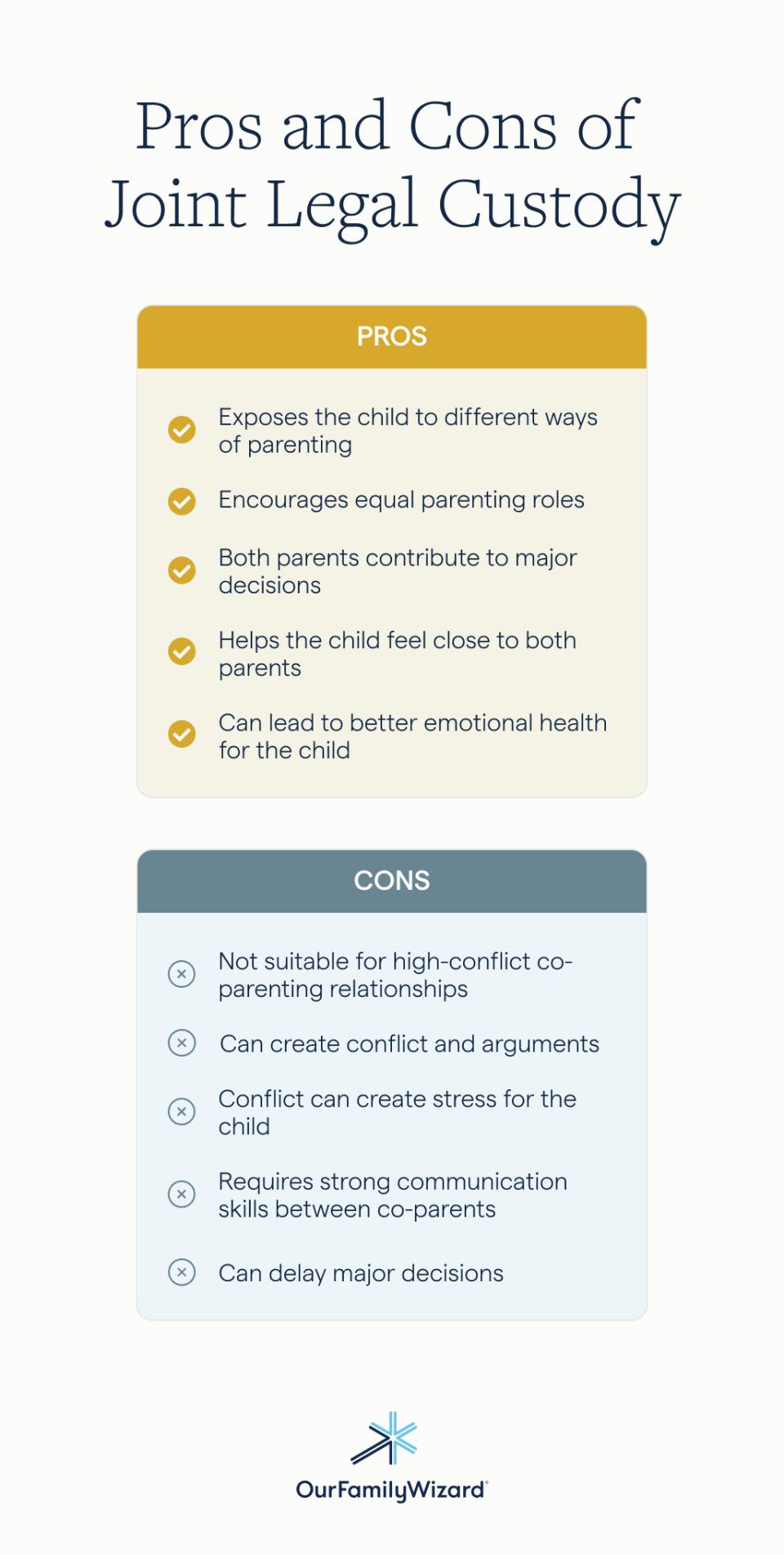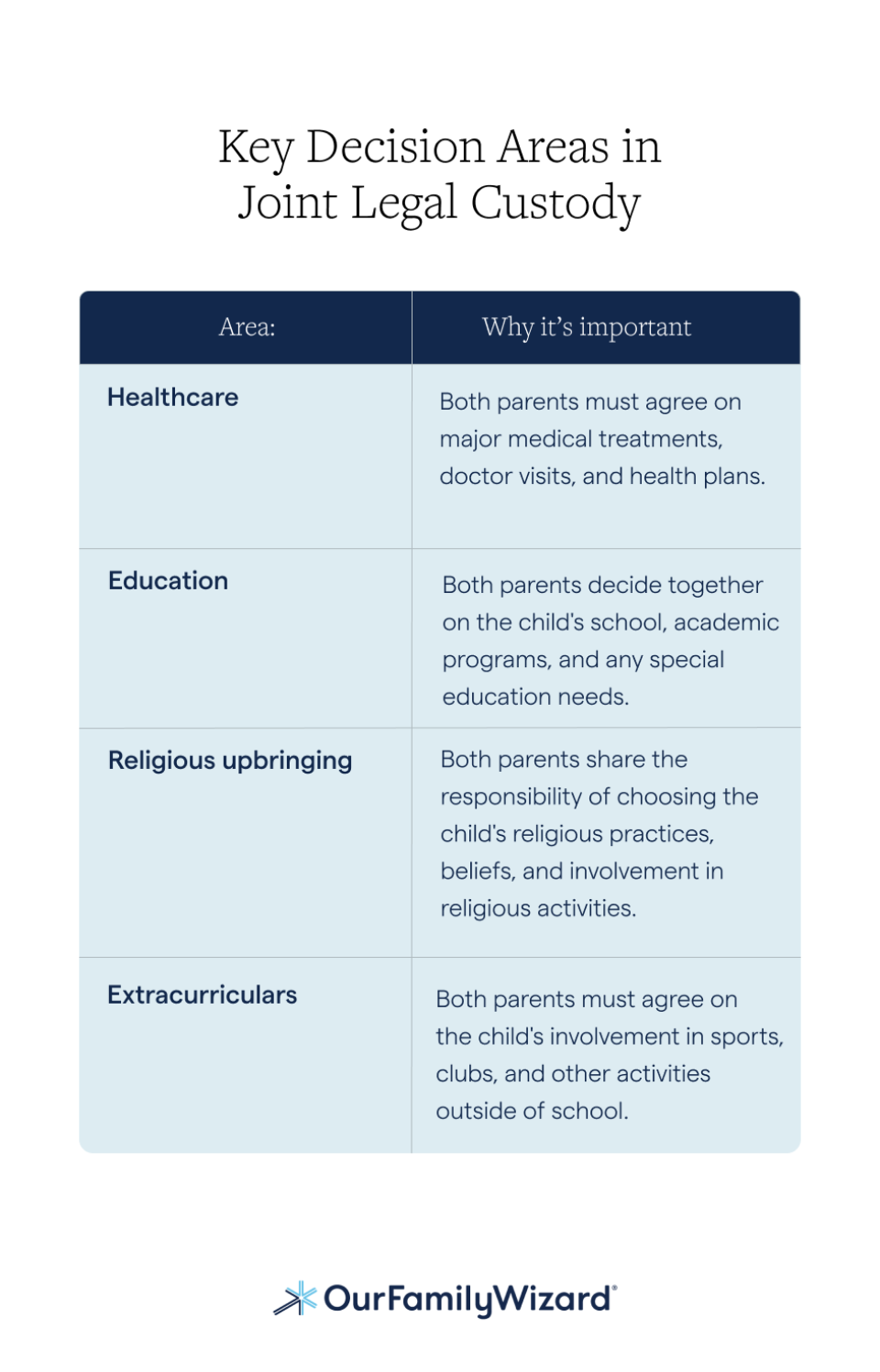A Guide to Joint Legal Custody: Pros, Cons, Examples, and State Laws
When making big decisions for your child, knowing your role is key. Explore what joint legal custody really means and whether it’s right for you. Get professional tips on how to make decisions together, so that you can make joint legal custody work well.
What is joint legal custody?
Joint legal custody means both parents share the right to make important decisions about their child. This typically includes choices about school, healthcare, religion, and activities. Co-parents must agree on these decisions, even if the child lives mostly with one parent.
The main goal of joint legal custody is to ensure both parents play an active role in raising their child. It lets both parents shape the major factors that influence their child’s life, like where they go to school and what extracurricular activities they participate in.
For joint legal custody to be successful, co-parents must cooperate and agree on major decisions. It works best when the parents have similar parenting views, a strong co-parenting relationship, and a history of making decisions together that prioritize the child’s well-being.
Key takeaways:
- In joint legal custody arrangements, parents share the right to make important decisions for their child, usually about healthcare, education, religion, and extracurricular activities.
- Joint legal custody focuses on sharing decisions, whereas joint physical custody focuses on sharing parenting time.
- The main benefit of joint legal custody is that it allows both parents to remain actively involved in the child’s life and promotes a stable, healthy co-parenting dynamic.
- Other terms for joint legal custody include “shared decision-making authority” and “shared parental responsibility.”
- The best way to communicate about decisions is through a co-parenting app with a secure messaging platform that keeps everyone accountable and on the same page.
How joint legal custody works
Under joint legal custody, co-parents need to work together to make major decisions, but they can choose how to manage this process. If a co-parent violates their agreement, the other can take legal action. Legal custody does not affect where the child lives.
When co-parents agree to joint legal custody, it usually means they will work together on decisions in four main areas: education, healthcare, religion, and extracurricular activities. Both parents have the legal right to make important choices for their child, and one parent may be able to hold the other in legal contempt if they make a major decision alone.
However, how joint legal custody works can be different for each family. Co-parents decide which choices to make together and how to settle disagreements, and they set rules for sharing decisions.
Co-parents decide which choices to make together and how to settle disagreements, and they set rules for sharing decisions.
Mary Jo Middlebrooks, a Tennessee family law attorney and Rule 31 Listed Mediator with 40 years of experience, recommends that co-parents consider how they want joint legal custody to work in their relationship. She advises them to include decision-making guidelines in a checklist of important items to include in their parenting plan.
“Every one of my parenting plans includes a section that outlines how parents will make decisions in four key areas: non-emergency healthcare, religious upbringing, education, and extracurricular activities,” she says. “This approach protects both co-parents, especially when they agree to joint legal custody. If one parent decides without consulting the other, they violate the terms of the parenting plan, and the other parent can take them to court if necessary.”
Other names to describe joint legal custody
Other names for joint legal custody are "shared decision-making responsibility" and "shared parental responsibility." Some professionals say that these terms better describe how parents work together. They emphasize the parenting process instead of just who has custody of the child.
Many states, like Washington and Colorado, no longer use the word "custody" because professionals say it focuses on control, not on the actual parenting or what's best for the child. This change aims to reduce conflict and encourage parents to cooperate. It also reflects modern views that put the child's needs first, and it supports shared decision-making.
As an example, Middlebrooks explains the terms her state uses. "In Tennessee, we don’t usually use terms like 'physical custody' or 'legal custody,'” she says. “Instead, we talk about 'primary' and 'alternate residential parenting' and use 'decision-making' to discuss legal custody.”
Here's a list of common terms relating to joint legal custody:
- Shared parental responsibility: This term emphasizes both parents' cooperative role in raising their child.
- Shared legal custody: This term is very similar to joint legal custody and stresses that parents have the same legal rights in making major decisions on behalf of their child.
- Shared or joint decision-making: Shared decision-making emphasizes that both parents make decisions together but doesn’t use the term ‘custody.’
- Co-parenting: Some professionals use the term co-parenting to mean that the parents are equal partners in parenting, including decision-making. However, most legal documents don’t use this term that way.
- Joint custody: Many state statutes refer to “joint custody” to collectively describe both joint physical and joint legal custody. In this context, “joint custody” typically means that joint legal custody is part of the arrangement.

Joint legal custody vs. joint physical custody
Joint legal custody means parents work together to make decisions about their child’s life. In contrast, joint physical custody means that the child splits their time with both parents. Legal custody is about who makes decisions, while physical custody is about where the child lives.
Legal and physical custody are types of custody encompass two different aspects of parenting. Both are important for the child’s well-being but involve different responsibilities. Physical custody means taking care of the child daily, while legal custody focuses on making larger decisions about the child's life rather than day-to-day care.
How does joint legal custody and joint physical custody work together?
Joint legal custody and joint physical custody keep both parents involved in their child's life. Both parents make important decisions together and spend regular time with the child. Usually, if co-parents have joint physical custody, they also have joint legal custody.
But co-parents can have joint legal custody without joint physical custody, or the other way around.
Michael Smith is a partner at Morton and Gettys, where he practices family law. He is also a certified mediator and arbitrator trained in collaborative divorce law. Smith says it’s more common for co-parents with joint physical custody to also have joint legal custody. However, he notes that parents who don't split time evenly often share decision-making.
family law. He is also a certified mediator and arbitrator trained in collaborative divorce law. Smith says it’s more common for co-parents with joint physical custody to also have joint legal custody. However, he notes that parents who don't split time evenly often share decision-making.
“If parents agree on joint physical custody or an equal parenting schedule, then joint legal custody naturally follows,” he explains. “However, the reverse isn’t necessarily true. For example, there are situations where both co-parents have joint decision-making authority on paper, but one parent has sole physical custody. That means that the child lives with one co-parent most of the time, but both have equal rights to make decisions, at least on paper.”
Most common reasons for joint legal custody
The primary reason for joint custody is to keep both parents actively involved in their child’s life. It ensures the child has a balanced relationship with both parents, which benefits their emotional well-being. Also, it can help co-parents maintain a cooperative partnership.
Here’s a detailed summary of the major reasons why parents may choose to share decision-making:
- To stay involved:
“Joint legal custody embodies the belief that both parents should help shape the major aspects of their child's life,” says Middlebrooks. “When parents collaborate effectively, it typically serves the child's best interests because it exposes them to different parenting styles and gives both parents the opportunity to contribute to the child’s upbringing.” - To maintain a balanced co-parenting relationship:
Joint legal custody helps co-parents maintain a cooperative partnership.
“If the two co-parents can work together, maintaining that cooperative relationship under a joint custody arrangement is often better than suddenly giving one co-parent authority over the other,” Smith says. “This balance allows them to maintain a positive parenting relationship where both feel they have a say.” - To help a non-residential co-parent stay involved:
Joint legal custody helps a parent who doesn’t live with the child stay connected and play an active role in the child’s life despite the distance.
Benefits of joint legal custody
Joint legal custody allows both parents to make important decisions together for their child. It encourages balanced co-parenting and keeps both parents involved. This helps the child build strong relationships with both parents, even when one lives farther away.
Here’s a detailed list of the major benefits of joint legal custody:
- Better emotional and long-term outcomes:
A growing body of research suggests that children do better when parents have joint custody arrangements. For example, a 2002 study looked at 33 different studies on how sole and joint custody affect children. The meta-analysis, Child Adjustment in Joint-Custody Versus Sole-Custody Arrangements: A Meta-Analytic Review, published in the Journal of Family Psychology, found that children tend to benefit from joint custody arrangements. Compared with children in sole custody arrangements, they have fewer emotional and behavioral issues, higher self-esteem, and better family relationships and academic performance.
The authors also pointed out that children still benefit from shared decision-making, even if they don’t spend equal time with both parents. This means that joint legal custody combined with sole physical custody can still lead to better outcomes for children. - Promotes stability:
Many professionals emphasize that when both parents are involved, children often feel more secure, helping them develop strong, stable relationships with both parents. - Balanced co-parenting relationship:
When both co-parents share equal decision-making authority, their relationship resembles a partnership rather than one parent dominating. This collaborative dynamic fosters mutual respect, creating a positive co-parenting environment that benefits both parents and their children.
Smith says it’s important to understand that the dynamics of the co-parenting relationship influence how beneficial joint legal custody can be for the child and co-parents.
“Sharing decisions works best for parents who, despite personal differences that lead to a separation, have a history of cooperating for the child’s best interests and share common values in healthcare, education, religion, and extracurricular activities,” he says.
Disadvantages of joint legal custody
The main disadvantage of joint legal custody is that it can lead co-parents to argue about decisions. It can create significant conflict and even delay important decisions. This can create a stressful environment for the child and harm their emotional well-being.
Here’s a summary of the disadvantages of joint legal custody:
- Conflict can result:
“South Carolina has a presumption against joint legal custody because it often leads to conflict,” explains Smith. “When parents can’t quickly agree on a major decision, it can slow down the decision-making process, which isn’t in the child’s best interest. Sole legal custody is more streamlined because only one parent is involved.”
Smith adds: “Most couples who were married and had a child share common values in the types of decisions that fall under joint legal custody. The area most prone to conflict is extracurricular activities. For example, if a child wants to join a travel sports team, one parent might support it while the other finds it too expensive or difficult to manage.” - It requires cooperation:
To successfully manage joint legal custody, parents need to cooperate and communicate effectively in a way that supports the child's best interests. This level of cooperation can be challenging for many divorced or separated couples. Decision-making can be difficult if one co-parent is uncooperative or if there is any hostility between them.
“One challenge of joint legal custody is that it requires effective communication,” says Middlebrooks. “Even parents with a very cooperative relationship who share the same values will eventually have disagreements that fall under the joint decision-making categories. Courts expect them to resolve these conflicts without frequently turning to legal intervention. If parents struggle to communicate or often disagree, joint decision-making can become more of a burden than a benefit.” - Decision-making can take longer:
Coordinating and making decisions can be complex and time-consuming. Checking with the other parent can delay major decisions even in a healthy and cooperative co-parenting relationship. This issue becomes even more challenging when co-parents have a history of arguing over decisions.
Smith describes a real-life situation that illustrates the problems that can arise under joint legal custody: “I recently wrapped up a case that dragged on for several years. The case centered around whether a child should take ADHD medication. One parent wanted it, while the other did not. Even with a psychiatrist's recommendation, there was still a significant battle. The worst part of these situations is that the child ends up stuck in the middle and can suffer.” - It can negatively impact the child:
If co-parents frequently argue over decisions, the child will inevitably notice and absorb this tension. Frequent conflict can cause stress and emotional strain. - Can create a power struggle:
“Unfortunately, shared decision-making can sometimes turn into a power struggle,” Middlebrooks says. “I’ve seen parents deliberately disagree with the other just to get back at them. It’s a shame, but in some bad dynamics, parents pit the child against the other parent without even realizing it. Sometimes, parents can even pit third parties, like teachers and doctors, in the middle of the conflict.”
In many joint legal custody arrangements, Smith notes, one parent gets a tie-breaker. This often occurs when one co-parent has sole physical custody. But sometimes, the parent may misuse this privilege, leading to increased conflict.
“If one parent has final decision-making authority, they have the last word in any disagreement,” he explains. “Technically, they’re supposed to consider the other parent’s opinion. In practice, however, joint legal custody often carries little weight if one parent consistently overrules the other. For example, if one parent suggests enrolling the child in a certain school, the parent with decision-making power might acknowledge their opinion but reject the suggestion with little consideration or regard for it. This setup can make the decision-making authority feel like a hollow exercise.”
What decisions generally fall under joint legal custody?
Joint legal custody is about making big decisions on healthcare, education, religion, and extracurricular activities. In these areas, parents work together to reach agreements. The parent who is with the child at the time makes everyday parenting decisions.
In practice, co-parents include a section in their parenting plan or order that outlines the specific decisions they will work on together and how they will handle disagreements. This approach clarifies which decisions fall under joint legal custody and which do not.
Here’s a brief summary of these important categories:
- Education: Both co-parents agree on decisions like which school the child attends, and they collaborate on decisions about tutoring or specific educational expenses.
- Healthcare: Parents collaborate on medical treatments, vaccinations, and choosing healthcare providers.
- Religion: Both parents agree on religious practices, such as attending services or participating in religious education.
- Extracurricular Activities: Parents discuss and approve sports, arts, or other activities the child participates in.
It’s essential to remember that joint legal custody does not cover every decision, just those that can significantly shape the child’s life.
“I like to remind parents that joint legal custody focuses on significant decisions that don’t come up that often,” adds Smith. “Otherwise, the parent with physical custody at that moment will handle the day-to-day decisions.”
How joint legal custody decision making can be divided
Co-parents can choose how to divide significant decisions under joint legal custody. They may collaborate on all major areas or assign each parent authority over specific areas. Usually, parents include a way to break ties in their parenting plan.
Joint legal custody allows both parents to make important decisions for their child. However, it’s up to the co-parents to create a joint legal custody parenting plan that includes guidelines on dividing these decisions and handling disagreements.
Here are the three major ways that co-parents split decision-making:
- Parents collaborate and try to address decisions ahead of time
“Parents can try to agree in advance on specific paths for major decisions,” Smith says. “For example, they might decide on a particular educational path and which schools the children will attend. They could also agree to follow the recommendations of the child’s healthcare provider for any healthcare decisions. Regarding religion, they could decide how the children will be raised in a specific faith, and for extracurricular activities, they might agree on participation in certain programs.” - Divide specific areas of decision-making
One common way to handle decision-making is to split it across the four categories. Smith explains: “For instance, the mother may have final authority over healthcare and education, while the father has authority over religion and extracurricular activities.” - Day-to-day decisions fall to the parent with physical custody
No matter how the parents choose to handle large decisions, in the vast majority of circumstances, the parent with physical custody has the authority to make less significant day-to-day decisions. This includes choices like what the child eats, when they go to bed, and whether they can go out with friends. (It should be noted that in some instances, certain decisions about what a child eats might be religious in nature and therefore fall under the major decisions, such as when a family keeps the laws of kashrut, only eats halal, or is strictly vegetarian.)
Different types of joint legal custody arrangements
There are several ways to set up joint legal custody arrangements. Some co-parents share both joint physical and legal custody, while others have joint legal custody, with one parent holding sole physical custody. One parent may also have the final decision-making authority during disagreements.
Here's a summary of the ways that co-parents integrate joint legal custody arrangements into their broader parenting arrangement:
- Pure joint legal custody: This arrangement means both parents share equal rights and responsibilities for decision-making and physical custody of the child.
- Joint legal custody with primary physical custody: In this arrangement, both parents work together on major decisions, but the child primarily resides with one parent. The other co-parent generally enjoys some overnight stays or visitation, but it’s not an equal split.
- Joint legal custody with a tie-breaker:
Some arrangements include a tie-breaker provision that gives one parent the final say in case of disagreements. This often occurs when the parents have joint legal custody, but one parent has primary physical custody. In these situations, the parent with primary custody also makes the final decisions. Sometimes, if one parent is an expert in one area, they hold the tiebreaker. For example, if one parent is a physician, they might get the tiebreaker for medical decisions.
"Joint legal custody allows both parents to have a say in major decisions affecting their child’s life, but it doesn’t always ensure equal influence,” says Middlebrooks.
“For instance, some parenting plans include tie-breaker provisions that give the primary residential parent the final say in case of disagreements. While this approach differs from true joint decision-making, I prefer it because it streamlines decisions and minimizes conflicts while still involving the non-residential parent.”
How joint legal custody varies by state
Joint legal custody laws differ by state and affect how parents share decision-making. Some states presume joint legal custody is beneficial, while others assume it's not. Also, states use different terms when they talk about joint legal custody.
Like most aspects of co-parenting, the specifics of how joint legal custody works depend on your state and jurisdiction.
Smith shares an example: “I’m located in Rock Hill, South Carolina – just across the state line from North Carolina. It’s just a stone’s throw away, but the family law processes in the two states are quite different.”
The main difference is whether a state has a presumption for or against joint legal custody. This means that family law courts might assume that joint custody is or isn’t in the child's best interest. For instance, South Carolina has a presumption against joint legal and physical custody. “Unless there are special circumstances showing that joint custody is best for the child, the court usually awards one parent sole custody,” explains Smith. The non-custodial parent typically gets some visitation rights.
Middlebrooks says her state, Tennessee, has no presumption for or against joint legal custody. "The court makes decisions on a case-by-case basis," she says.
In other states, like California, the law assumes that joint legal custody is in the child's best interest. They usually grant sole legal or physical custody only if both parents agree or if one parent can clearly show it’s best for the child.
Smith and Middlebrooks emphasize that these presumptions apply only to family law cases that reach court because the co-parents can’t agree about decision-making on their own.
"The court typically respects any agreement parents reach on their own," Middlebrooks explains.
Smith adds, “While it’s rare for courts to award joint custody, it’s also rare for family law matters to go to trial. That means that if parents agree to joint custody—which many do—the family court is very unlikely to contest the decision.”
Co-parent communication in joint legal custody arrangements
Effective communication is key to joint legal custody. Professionals suggest using clear and secure communication methods, such as co-parenting apps, to stay accountable. Co-parents who struggle to agree can also seek professional help to guide their discussions and focus on the child's best interests.
Here are recommendations from family law professionals on how to effectively communicate when making decisions together:
- Focus on the child
“I like to remind my clients that it’s all about making decisions together for the child,” stresses Middlebrooks. “Unfortunately, it’s surprising how often people focus on ‘winning’ a conversation instead of working toward a mutual decision that truly serves the child’s best interests.”
Middlebrooks emphasizes the importance of always asking how each decision will benefit the child. Instead of framing the conversation around what you and the other co-parent want, focus on how each choice supports your child and sets them up for a successful future.
She adds, “Most parents genuinely want what is best for their child, but even in the most harmonious co-parenting relationships, a power struggle can sneak in. You’d be amazed at how a little mindfulness around that issue can help keep the focus on the child.” - Document important decisions
Keep a written record of agreements and decisions regarding the child's education, healthcare, and other significant matters. This practice serves as a reference and helps prevent misunderstandings or disagreements. - Seek professional help
If conflicts arise that you can't resolve together, consider involving a mediator or therapist. Professionals can provide guidance and facilitate productive conversations, helping both parents find common ground. - Use a co-parenting app
“When there’s a chance for decision-making disputes between co-parents, I always recommend using a co-parenting app, like OurFamilyWizard, to document conversations and agreements,” says Smith. “This way, if anything goes to court, we have a clear paper trail of communication between the parties.”
Make co-parenting easier with OurFamilyWizard
When co-parenting gets tricky, OurFamilyWizard smooths out the bumps. The app streamlines communication, keeping everyone in sync. With its secure messaging feature, conversations stay clear and accountable because there's no room for doubt regarding big decisions.
OurFamilyWizard designed its app with one user in mind: the co-parent. Use it as your central hub for co-parenting, helping you stay connected about decisions big and small. The time-stamped, secure messaging, alongside a shared calendar, keeps the focus on what matters most.
The app is useful—or essential—for co-parents across all custody arrangements, whether they’re sharing homes, decisions, or navigating any co-parenting experience in between.
Experience the features for yourself and discover why more legal professionals recommend OurFamilyWizard’s co-parenting app to their clients over any other option.



